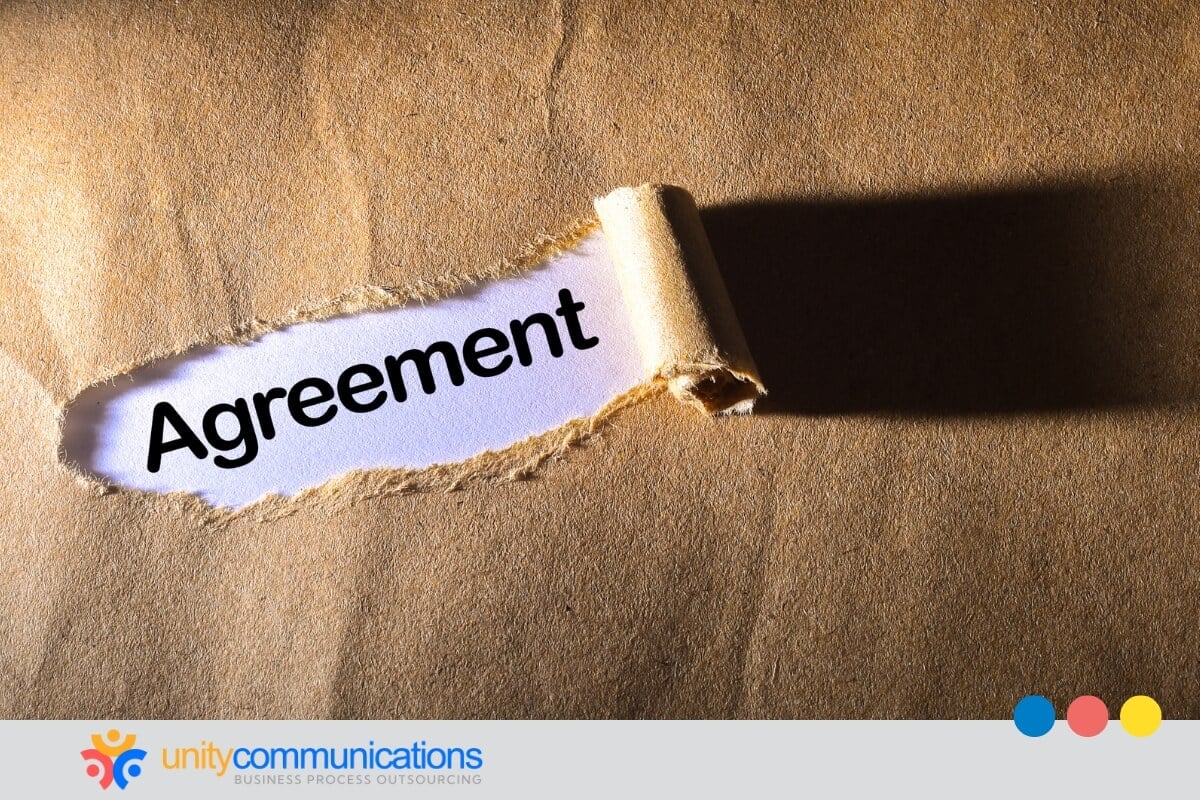IN THIS ARTICLE
Table of Contents
Streamlining human resources (HR) tasks, from payroll processing to employee management, is possible with employer of record (EOR) services. These business solutions allow leaders to focus on core activities, access a global talent pool, and accelerate time to market while reducing costs.
Securing the right terms with the EOR provider is critical to attaining and maximizing its benefits.
This article explains how to optimize your partnership with your chosen employer of record. It explores critical preparation, negotiation, and finalization tips for protecting your best interests when entering an EOR agreement.
1. Preparation: Research and identify your EOR needs

Before diving into negotiations, establish a solid foundation by assessing your HR needs. Define what you want to accomplish by partnering with an EOR provider. Is it to ensure compliance, enhance payroll efficiency, or improve employee benefits?
At the same time, analyze your current and future HR requirements, prioritizing the most critical services for your daily operations. Will you need data entry services, automation tools, and cloud technology? Consider how EOR services can scale as your team grows.
Then, research the different service models and pricing structures and decide on the best option based on your needs. Understanding the various employer of record approaches helps you negotiate better deals and tips your partnership toward success.
With this information, you can move on to finding a potential provider. Focus on companies specializing in your industry. Thoroughly browse their website, marketing materials, case studies, and client reviews for the following criteria:
- Industry experience and expertise
- Service inclusions and rates
- Scalability and flexibility
- Compliance and risk management capabilities
- Technology integration
- Data security certifications (e.g., ISO 27001 and SOC 2)
- Customer support and communication
- Reputation and references
- Culture and values
Finally, compare your chosen providers’ services, features, and rates. By researching, benchmarking, and identifying your needs, you can negotiate terms that directly address your business’s unique situation. It is the secret to getting the best value for your EOR investment.
2. Negotiation: Strike a balance and protect your interests

Securing a deal that benefits your business and guarantees a long-term partnership requires clear communication. By openly discussing your needs and expectations with the employer of record, you can effectively negotiate terms that tip the scales in your business’s favor in the long run.
Let us discuss the key areas to navigate during the process:
Clarity on services and fees: Avoiding hidden costs
Ensure transparent discussions about EOR services. Ask questions and request detailed descriptions to avoid future disputes. The more you understand the services offered, the better equipped you are to negotiate a deal.
Inquiring about a complete breakdown of all associate fees is equally important. That includes the base service charge, per-employee charges, and any potential additional costs for onboarding, compliance audits, or other services. Negotiating an all-inclusive price from the outset helps avoid unexpected and hidden fees.
If an EOR’s terms are vague, request plain-language explanations. Hire a legal counsel to understand the agreement and avoid hidden clauses.
Flexibility and scalability: Adapting to your growth
Discuss your anticipated growth to allow seamless scaling of EOR services as your team expands. Settle terms regaridng:
- Headcount flexibility
- Scalable service levels
- Adaptability clauses
Understand an EOR’s onboarding process to determine its scalability. A streamlined and adaptable system shows how quickly it can adapt to changes in employee demographics or needs.
Evaluating an employer of record’s technology platform is another negotiation tip to consider. A modern and scalable network empowers the provider to adapt to your changing requirements. It promotes seamless integration with your HR systems and accommodates future employee base growth.
If you find that a provider has inflexible packages, negotiate customization or explore modular options. Be prepared to walk away if necessary. You have other options and can compare different providers to find one that meets your needs.
Compliance and liability assurance: Sharing the burden
Verify your EOR’s track record of complying with relevant labor laws, tax regulations, and industry standards. Follow these steps:
- Research their track record and history for compliance (e.g., industry expertise, geographic focus, and previous compliance issues).
- Read client reviews and testimonials (e.g., from industry networks, online resources, and third-party review sites).
- Check their professional licenses. (e.g., employer registration, business, and industry-specific licenses).
- Ask about their insurance and coverage (e.g., professional liability insurance, workers’ compensation insurance, and general liability insurance).
Once you know their compliance capabilities, negotiate clear terms outlining liability distribution in case of employment-related issues. Although the EOR assumes primary responsibility for compliance-related risks, liability clauses typically include:
- Shared responsibility agreements
- Covered issues where EOR assumes liability
- Dispute resolution process
If issues regarding unclear compliance arise, request plain-language explanations and focus on shared responsibility clauses. You can also seek legal counsel.
Address miscommunication and related issues during negotiation. Establish communication channels, request a dedicated point of contact, and include an escalation clause in the agreement.
Data security and privacy: Protecting your information
The security of your company and employee data is critical. As with information technology (IT) support outsourcing, find an EOR provider that has robust security protocols and meets industry best practices.
Ask the EOR provider for detailed information about their security policies and procedures, such as the following:
- Data encryption, storage, and management
- Access controls
- Regular security assessments
- Disaster recovery plans
Once you have this information from your employer of record, consider negotiating clear terms that guarantee compliance with relevant data privacy regulations. As a tip, ask your provider about its adherence to the General Data Protection Regulation (GDPR).
Additionally, establish clear protocols for accessing and managing employee data stored by the EOR. Include clauses that outline their responsibilities for data protection, data breach notification procedures, and your right to audit their security practices.
3. Finalization: Ensure accuracy in your EOR agreement

Once your negotiations are complete and you’ve reached an agreement with your chosen EOR, carefully review the contract before signing. This step ensures the document reflects all negotiated terms accurately, including:
- Service inclusions and exclusions
- Fee structure and pricing details
- Compliance responsibilities
- Indemnification clauses
- Data security protocols
- Termination procedures
Even if the contract seems straightforward, consult a lawyer specializing in employment law. They can provide valuable insights, check if the agreement aligns with your needs and goals, and identify overlooked red flags.
Maintaining copies of all communication with the employer of record throughout the negotiation process is a great tip to consider. Documentation is helpful if any disagreements arise, serving as evidence to support your interpretation of the contract.
Additionally, remember that negotiation is a two-way street. While seeking the best deal, consider the value proposition the EOR offers to ensure you don’t spend more than you gain from the partnership.
The bottom line
Negotiating a beneficial contract is key to the success of your EOR partnership. Researching services, rates, and potential providers, communicating vague clauses, and understanding both parties’ obligations are critical.
These steps help you bargain terms that can streamline HR tasks and increase cost savings. They empower you to ask for better deals and walk away from an EOR provider that does not serve your best interest.
Establish a solid, mutually beneficial, long-lasting partnership with an EOR through excellent negotiations. Let’s connect if you want to learn more about EOR services and are looking for a provider that meets your needs.





